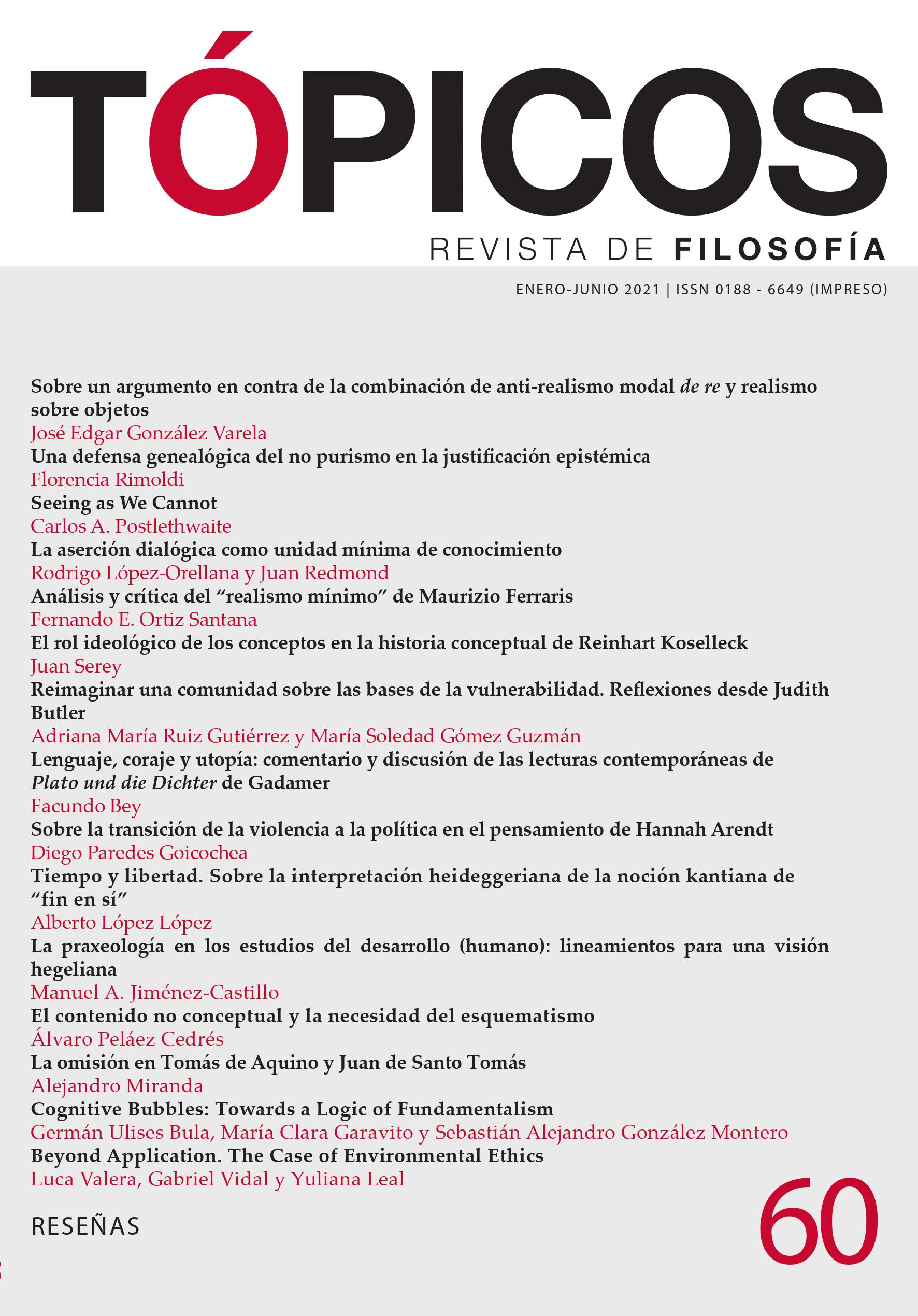Una defensa genealógica del no purismo en la justificación epistémica
Pubblicato 2020-10-27
Parole chiave
Come citare
Downloads
Altmetrics
Citas
Abstract
En este trabajo defiendo una concepción no purista de la justificación epistémica, según la cual ésta depende en parte de factores “no conducentes a la verdad”, como el contexto pragmático de las personas. Para ello pongo en relación tres perspectivas distintas sobre la noción de creencia justificada. En la primera sección analizo los aspectos prominentes de la noción pre-teórica. En la segunda sección defiendo una posición no purista permisiva que recoge teóricamente los elementos de la noción pre-teórica y los amplía hacia el no purismo. En la tercera sección defiendo esta posición mediante una explicación genealógica del origen del concepto.
Riferimenti bibliografici
- Alston, W. P. (2005). Beyond “Justification”. Dimensions of Epistemic Evaluation. Cornell University Press.
- Audi, R. (2003). Epistemology. A Contemporary Introduction to the Theory of Knowledge. Routledge.
- Bonjour, L. (1985). The Structure of Empirical Knowledge. Macmillan.
- Chisholm, R. M. (1976). Theory of Knowledge. Prentice Hall.
- Clifford, W. K. (1999). The Ethics of Belief. En T. Madigan (ed.), The Ethics of Belief and Other Essays. (pp. 70-96). Prometheus.
- Craig, E. (1990). Knowledge and the State of Nature. An Essay in Conceptual Synthesis. Clarendon Press.
- Chignell, A. (2018). The Ethics of Belief. En Edward N. Zalta (ed.), The Stanford Encyclopedia of Philosophy. URL: https://plato.stanford.edu/archives/spr2018/entries/ethics-belief/.
- Cohen, S. (1984). Justification and Truth. Philosophical Studies, 46, 279–295.
- Conee, E. y Feldman, R. (1985). Evidentialism. Philosophical Studies, 48, 15-35.
- David, P. (2001). Evidentialism reconsidered. Noûs, 35, 239–259.
- Fantl, J. y McGrath, M. (2002). Evidence, Pragmatics, and Justification, The Philosophical Review, 111, 67-94.
- Fantl, J. y McGrath, M. (2009). Knowledge in an Uncertain World. Oxford University Press.
- Fantl, J. y McGrath, M. (2012). Pragmatic Encroachment: It´s not Just About Knowledge. Episteme, 9(1), 27-42.
- Foley, R. (2001). Intellectual Trust in Oneself and Others. Cambridge University Press.
- Fricker, M. (2007). Epistemic Injustice. Power and the Ethics of Knowing. Oxford University Press.
- Goldman, A. (2000). What is Justified Belief? En E. Sosa y J. Kim (eds.), Epistemology. An Anthology. (pp. 340-353). Wiley-Blackwell.
- Harman, G. (1999). Rationality. En Reasoning, Meaning, and Mind. (pp. 9-45). Clarendon Press.
- Haslanger, S. (2005). What are We Talking About? The Semantics and Politics of Social Kinds. Hypatia, 20(4), 10-26.
- Hawthorne, J. y Stanley, J. (2008). Knowledge and Action. The Journal of Philosophy, 105(10), 571-590.
- Kelly, T. (2016). Evidence. En Edward N. Zalta (ed.), The Stanford Encyclopedia of Philosophy. URL: https://plato.stanford.edu/archiveswin2016/entries/evidence/.
- Kusch, M. (2009). Testimony and the Value of Knowledge. En A. Haddock, A. Millar y D. Pritchard (eds.), Epistemic Value. (pp. 60-94). Oxford University Press.
- Moran, R. (2006). Getting Told and Being Believed. En J. Lackey y E. Sosa (eds.), The Epistemology of Testimony. (pp. 272-306). Oxford University Press.
- Nozick, R. (1981). Philosophical Explanations. Oxford University Press.
- Peirce, C. S. (1877). The Fixation of Belief. Popular Science Monthly, 12, 1-15.
- Plantinga, A. (1993). Warrant: The Current Debate. Oxford University Press.
- Pollock, J. (1986). Contemporary Theories of Knowledge. Rowman & Littlefield.
- Pryor, J. (2001). Highlights of Recent Epistemology. British Journal for the Philosophy of Science, 52, 95–124.
- Reisner, A. (2009). The Possibility of Pragmatic Reasons for Belief and the Wrong Kind of Reasons Problem. Philosophical Studies, 145, 257–272.
- Reisner, A. (2017). Pragmatic Reasons for Belief. En D. Star (ed.), The Oxford Handbook of Reasons and Normativity. (pp. 705-730). Oxford University Press.
- Rimoldi, F. (2014). ¿Puede el conocimiento ser un estado mental? Análisis Filosófico, 34(2),171-201.
- Rimoldi, F. (2018). El valor del conocimiento: un método y una explicación. En L. Ruivo (ed.), Proceedings of the Brazilian Research Group on Epistemology 2018. Social Epistemology. (pp. 39-72). Editora Fi.
- Sosa, E. (2015). Judgment and Agency. Oxford University Press.
- Stanley, J. (2005). Knowledge and Practical Interests. Oxford University Press.
- Williams, B. (2002). Truth and Truthfulness. An Essay in Genealogy. Princeton University Press.
- Williamson, T. (2000). Knowledge and its Limits. Oxford University Press.







